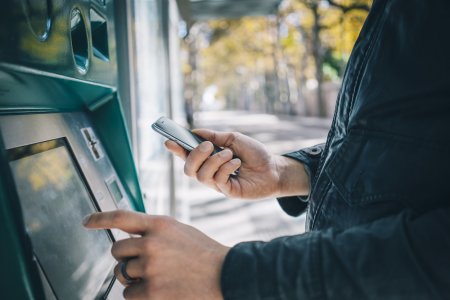Could Australia go cashless in just three years? Here's what a finance expert wants you to know
- Replies 39
As we continue to venture deeper into the digital age, it seems like we're moving further away from the physical, and one area where this is notably occurring is in how we handle our good old-fashioned money. The times of counting our notes and loose change may soon be gone entirely, replaced with a swish of a card or the simple click of a button. Yes, it seems that the days of the shiny dollop and the humble five-cent piece could be numbered.
Celebrated finance expert Sarah Wells has forecasted a concerning prospect - Australia could be on the express route to becoming a full-blown cashless society in as short a time as three years.
According to Wells, such a societal shift isn't purely a sign of technological progress but could, quite tragically, bring about notable hardship, particularly for certain demographic groups. We know that a cashless society won't be all sunshine and roses for everyone.
But who exactly stands to suffer in the crossfire of this economic overhaul, you ask? Well, let's take a look.
Regional Australians are potentially in the firing line, and proof of this already exists in the closure of more than 1,600 bank branches between June 2017 and July 2022, hitting regional communities the hardest. In addition, in the event of emergencies, cash is often the safest and most reliable fallback.
Remember the 2022 floods in Lismore? With electronic payment systems down, it was the tried and true cash that saved the day as five credit unions flew in a helicopter laden withphysical currency to aid locals.
Vulnerable sections of society, such as the elderly, young children, indigenous Australians and even new immigrants, may find themselves at a disadvantage. We published an article on August 1 that explained Australia’s big banks ‘are still committed to cash’ and swear ‘they are not going cashless’. We had 30 comments from our members on that article, who all explained they have had completely different experiences.
Member @bluetang explained, ‘When you need change e.g. coins what teller machine gives you those? What use a credit card for a $2.50 roll? Even Govt. dept. charge a fee for using a card. Up go the prices because banks charge for card use.’
Another member, @NotNats shared, ‘I said it before, and I will say it again the BIG FOUR don't care about their old customers. They are closing branches & ATM services everywhere, so you have to go cashless. I still can't for the life of me understand why they don't all get in bed with other and open MULTI branches in the rural towns of Aus, one branch to service them all kind of thing. Remember, even in this day and age there are many people who cannot use digital applications to access their money due to many different reasons.’
This point made by member @NotNats is extremely true, why can’t we see more multi-branches? It could be a great solution for the banks, and most certainly for our members.
Member @Ishka28 explained, ‘The figures the banks give on digital users and in-bank users are extremely misleading. Of course, the percent of digital users has increased as the banks have closed branches forcing people to use the internet and bank cards. And as for smart ATMs, they are as difficult to find as a bank. Most of the smart ATMs are actually inside the bank. It is very difficult for someone who doesn't drive anymore to do any banking outside of the internet. And sometimes, there is a need to actually talk to someone at a bank. Then there is the issue of card blockage. The other day I was actually in a bank. The three people in front of me in line were there to get their cards unblocked. This is simply ridiculous. Cards seem to easily get blocked and not so easily get unblocked.’
We couldn’t agree more with member @Ishka28. A few members of the SDC team have had to line up for hours to get their cards unblocked as well.
Respected senior citizens, whilst they too are using less cash, are still its primary users. Wells explained almost one in five Aussies over the age of 65 is classified as a 'high cash user'.
On top of the experience of our members, there is no doubt that cash transactions, as Wells points out, act as a valuable learning experience for children to understand the worth of money and also improve their social skills.
'Giving a child $20 and taking them to a shopping centre, or the movies helps them to learn to budget and helps them to make decisions by thinking more carefully,' Wells advised.
Not to mention, online payments have given rise to a prosperous industry of intermediaries called payment service providers. These payment middlemen make their money by charging small fees on each transaction, a fee that wouldn't exist in a simple cash transaction.
Amid rounds of criticism faced by the cyber world, the Reserve Bank of Australia noted that 'privacy and security concerns with electronic payment methods continued to be the main reason for needing cash,' and we'd be in agreement with them on this one.
Although Wells does believe the shift towards a cashless society is inevitable, she doesn't advocate for such a drastic change to occur at warp speed, calling for a more considerate approach. 'I think we need to stop thinking about ourselves so much and our own convenience and start thinking a bit more about others,' she said wisely.

So, dear members, while we may be heading towards a cashless society in just a few short years, let's stand by our coins and notes and use them when it still makes sense to do so. While the world may be changing around us, a simple coin or banknote can still hold a lot more value than we might think. What do you think of this article, members? What are your thoughts and opinions on moving to a cashless society? Share your thoughts with us in the comment section below.
Celebrated finance expert Sarah Wells has forecasted a concerning prospect - Australia could be on the express route to becoming a full-blown cashless society in as short a time as three years.
According to Wells, such a societal shift isn't purely a sign of technological progress but could, quite tragically, bring about notable hardship, particularly for certain demographic groups. We know that a cashless society won't be all sunshine and roses for everyone.
But who exactly stands to suffer in the crossfire of this economic overhaul, you ask? Well, let's take a look.
Regional Australians are potentially in the firing line, and proof of this already exists in the closure of more than 1,600 bank branches between June 2017 and July 2022, hitting regional communities the hardest. In addition, in the event of emergencies, cash is often the safest and most reliable fallback.
Remember the 2022 floods in Lismore? With electronic payment systems down, it was the tried and true cash that saved the day as five credit unions flew in a helicopter laden withphysical currency to aid locals.
Vulnerable sections of society, such as the elderly, young children, indigenous Australians and even new immigrants, may find themselves at a disadvantage. We published an article on August 1 that explained Australia’s big banks ‘are still committed to cash’ and swear ‘they are not going cashless’. We had 30 comments from our members on that article, who all explained they have had completely different experiences.
Member @bluetang explained, ‘When you need change e.g. coins what teller machine gives you those? What use a credit card for a $2.50 roll? Even Govt. dept. charge a fee for using a card. Up go the prices because banks charge for card use.’
Another member, @NotNats shared, ‘I said it before, and I will say it again the BIG FOUR don't care about their old customers. They are closing branches & ATM services everywhere, so you have to go cashless. I still can't for the life of me understand why they don't all get in bed with other and open MULTI branches in the rural towns of Aus, one branch to service them all kind of thing. Remember, even in this day and age there are many people who cannot use digital applications to access their money due to many different reasons.’
This point made by member @NotNats is extremely true, why can’t we see more multi-branches? It could be a great solution for the banks, and most certainly for our members.
Member @Ishka28 explained, ‘The figures the banks give on digital users and in-bank users are extremely misleading. Of course, the percent of digital users has increased as the banks have closed branches forcing people to use the internet and bank cards. And as for smart ATMs, they are as difficult to find as a bank. Most of the smart ATMs are actually inside the bank. It is very difficult for someone who doesn't drive anymore to do any banking outside of the internet. And sometimes, there is a need to actually talk to someone at a bank. Then there is the issue of card blockage. The other day I was actually in a bank. The three people in front of me in line were there to get their cards unblocked. This is simply ridiculous. Cards seem to easily get blocked and not so easily get unblocked.’
We couldn’t agree more with member @Ishka28. A few members of the SDC team have had to line up for hours to get their cards unblocked as well.
Respected senior citizens, whilst they too are using less cash, are still its primary users. Wells explained almost one in five Aussies over the age of 65 is classified as a 'high cash user'.
On top of the experience of our members, there is no doubt that cash transactions, as Wells points out, act as a valuable learning experience for children to understand the worth of money and also improve their social skills.
'Giving a child $20 and taking them to a shopping centre, or the movies helps them to learn to budget and helps them to make decisions by thinking more carefully,' Wells advised.
Not to mention, online payments have given rise to a prosperous industry of intermediaries called payment service providers. These payment middlemen make their money by charging small fees on each transaction, a fee that wouldn't exist in a simple cash transaction.
Amid rounds of criticism faced by the cyber world, the Reserve Bank of Australia noted that 'privacy and security concerns with electronic payment methods continued to be the main reason for needing cash,' and we'd be in agreement with them on this one.
Although Wells does believe the shift towards a cashless society is inevitable, she doesn't advocate for such a drastic change to occur at warp speed, calling for a more considerate approach. 'I think we need to stop thinking about ourselves so much and our own convenience and start thinking a bit more about others,' she said wisely.
Key Takeaways
- Finance expert Sarah Wells predicts Australia could become a cashless society within three years, with particular impact expected for regional areas, emergencies, indigenous Australians, immigrants, the elderly and children.
- Young people will be particularly affected as they will lose valuable social interactions and financial learning opportunities with the increase of only digital transactions.
- Wells explained almost one in five Aussies over the age of 65 is classified as a 'high cash user', so a cashless society will significantly impact them.
- While Wells believes the transition to a cashless society is inevitable, she highlights that hundreds of thousands of Australians will be negatively affected and recommends that the change should be gradual rather than rushed.
So, dear members, while we may be heading towards a cashless society in just a few short years, let's stand by our coins and notes and use them when it still makes sense to do so. While the world may be changing around us, a simple coin or banknote can still hold a lot more value than we might think. What do you think of this article, members? What are your thoughts and opinions on moving to a cashless society? Share your thoughts with us in the comment section below.










